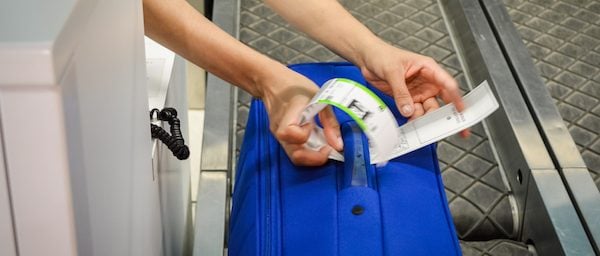Airline Card Fine Print May Leave You Holding the Bag Fee
Even if you have an eligible co-branded airline credit card, the perk isn't guaranteed. Here's how the benefit works, plus 10 'gotchas' to avoid.

Many or all of the products on this page are from partners who compensate us when you click to or take an action on their website, but this does not influence our evaluations or ratings. Our opinions are our own.
Update: On March 11, 2025, Southwest announced that two bags will no longer fly free for flights booked on or after May 28, 2025, ending a longstanding and popular policy that had defined the airline. The first checked bag will cost $35 and the second checked bag will cost $45.
However, select Southwest flyers — including those with elite status, Business Select flyers and Rapid Rewards credit cardholders — will still get at least one free bag. Other changes of note for flights booked on or after May 28, 2025:
Southwest will replace its Wanna Get Away fares with a new Basic fare that earns only 2 points per dollar and implement dynamic pricing for award redemptions.
Flight credits will now carry a one-year expiration date, or six months for Basic tickets.
The airline also plans to begin operating flights with seat assignments and extra-legroom seats in 2026, ending its open-seating policy.
Read NerdWallet's story on Southwest's changes for details.
Marketers for airline credit cards often emphasize the miles or points you can rack up using the card, but their most valuable benefit for the average person may be free checked bags, a perk that potentially saves hundreds of dollars a year.
But just because you have the right airline card doesn't mean you'll always get the checked-bag freebie, due to a plethora of gotcha exceptions found in the fine print of cardholder agreements.
For example, two major airlines, United Airlines and JetBlue Airways, require you to book airfare with their co-branded airline cards to be eligible for free checked bags on that flight. And sometimes the travel booking website you used might disqualify you from checking a bag for free.
Airlines make more than $4 billion a year from bag fees, according to the U.S. Department of Transportation. So maybe it's not surprising that they limit their baggage-fee waivers.
Most of the time you'll get the free baggage benefit without hassle and when you expect it. But it's important to know about exceptions. Here's what you need to know if you have a co-branded airline card that offers free checked bags, plus 10 gotchas to be aware of.
How bag-fee waivers work with many airlines
Usually, using a credit card's checked-bag fee waiver is pretty easy. You simply won't be charged if your card account is in good standing. How many fellow travelers on your reservation also get a free checked bag depends on your card. It may range from no additional passengers getting the benefit to eight others.
With most U.S. airlines, your checked-bag perk stems from being a credit cardholder, but the perk is tied to your frequent flyer account. That's why it's important to link your frequent flyer number to your reservation before checking in. This often happens automatically if you book at the airline website while logged in to your account, or you can enter your frequent flyer number when you book or add it to your reservation later. Because of that link, many carriers allow you to pay for airfare with any credit card because the airline already knows you're also a holder of its co-branded credit card.
At the airport, whether tagging your own bags at a kiosk or using an agent at a ticket counter, if you followed the rules, you won't be charged for a standard first checked bag and usually don't need to have the card with you.
But, of course, rules for airlines differ, and most have a lengthy list of exceptions.
The bag-fee waiver benefit of a co-branded airline credit card typically applies to domestic flights. Most international flights allow a checked bag for no extra charge. (Flights to Canada or the Caribbean may be exceptions.) The card often does not entitle you to an additional free checked bag.
10 gotchas for free checked bags
Checking your cardholder agreement is the best way to uncover details about the checked-bag fee waiver, but here are examples of exceptions from U.S carriers that you might find in the fine print.
Using the wrong credit card for airfare. Maybe the most notable exception involves airlines such as United, JetBlue and Hawaiian, which require you to pay for the airfare with their co-branded credit card to qualify for the fee waiver. If you're flying on a "free" award ticket you paid for with miles on United, you must pay the taxes and fees with a MileagePlus card.
Booking on ineligible websites. United specifically says "unpublished fares, such as those purchased on priceline.com and Hotwire, are not eligible." Publicly disclosed fares from such online travel agencies as Expedia and Orbitz are OK. Hawaiian Airlines requires you to book at its website and use its credit card to get a free checked bag.
Excluding a frequent flyer number. With many airlines, the key to getting free checked bags is linking your frequent flyer number to your reservation. So you need to have a frequent flyer account and number and include it on every booking when you want to use the bag benefit.
Bringing big bags. The bag benefit usually doesn't apply to overweight or oversized bags. That might include golf clubs, for example.
Adding extra bags. Typically, the benefit is for the first standard checked bag per person. Some cards may allow two bags each, including upper-tier United cards such as the United Club℠ Card.
Elite status stacking. Frequent flyer elite status usually gets you a free checked bag, too. But typically you can't "stack" the benefits of elite status and cardholder status to get two checked bags. Delta is a notable exception. Flyers with its lowest elite level, Silver Medallion, can get an extra bag free if they have a co-branded credit card with a checked-bag benefit. Higher elite levels on Delta already get more than one checked bag free.
Checking pets as luggage. Checked-bag waivers don't apply to pets checked as baggage. Separate pet fees apply.
Flying airline partners. While your bag benefit is good on regional carriers the airline uses as subcontractors — typically between small airports and hubs — it often doesn't apply to codeshare flights. Codeshares are when two or more airlines sell seats on the same flight. The baggage policy of the airline operating the flight typically applies.
Being only an authorized user. Typically, the primary cardholder must be on the travel itinerary to get the baggage-fee waiver. Being an authorized user is not good enough unless you're traveling with the primary cardholder on the same reservation.
Being a new cardholder. Some airlines warn that your credit card account must be open so many days before travel to get the benefit. Seven days is typical. Delta says it's available after you receive your physical card. United says your account must be open two weeks.
Other ways to get free checked bags
If you're caught in one of the airline card exceptions and don't have frequent flyer elite status, you can avoid shelling out cash for checked bags if you have other travel cards that might cover the expense.
Some luxury travel cards come with an annual travel credit that can be used toward checked-bag fees. Examples are the American Express Platinum Card® and the Chase Sapphire Reserve®.
And some general travel cards allow you to essentially erase travel expenditures like checked-bag fees by applying accumulated points to get a statement credit. Examples include the Capital One Venture Rewards Credit Card and the Bank of America® Travel Rewards credit card.
Also, some airlines waive bag fees for active military.
Check your airline
Rules about free checked bags vary by airline and can change over time. A quick online search should turn up the right page with an airline's baggage rules and its co-branded card rules. Here are links to policies for some major airlines:
Southwest Airlines doesn't charge for the first two checked bags, and its co-branded credit cards don't offer perks for checking additional bags.
While the airline card checked-bag fee waiver is valuable and generally easy to use, it doesn't apply in all situations. So it's worth a few minutes to examine the limitations of your bag benefit.
Find the right credit card for you.
Whether you want to pay less interest or earn more rewards, the right card's out there. Just answer a few questions and we'll narrow the search for you.




